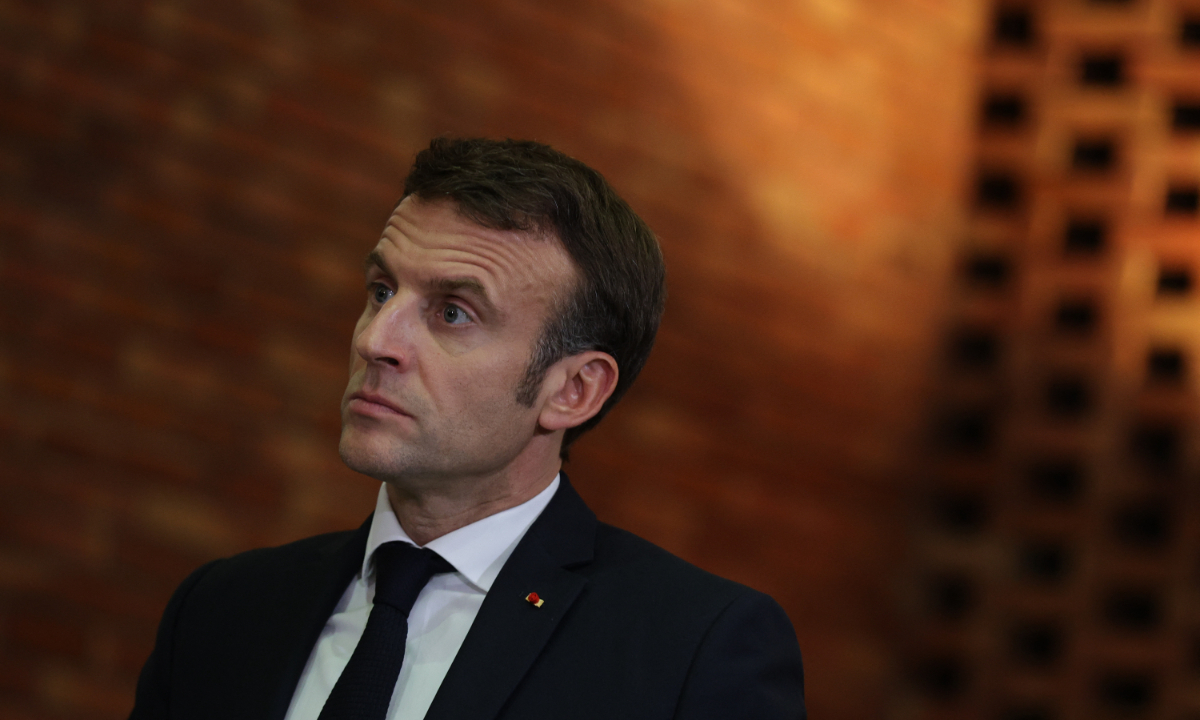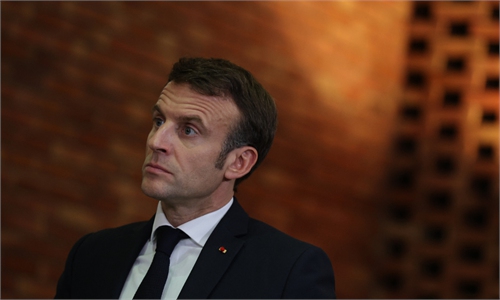
French President Emmanuel Macron Photo:AFP
French President Emmanuel Macron was set to meet US President Joe Biden for talks on Thursday, marking his first formal state visit to the White House during the Biden presidency. Experts believe that the talks could exacebate frictions between EU and the US and divisions within Europe.
As some European media outlets pointed out, tensions are rising over trade as Europeans nervously watch the rollout of Biden's signature policy — the Inflation Reduction Act (IRA).
The IRA, which came into effect in August, aims to reduce the cost of living for Americans. The bill covers not only huge investments in the energy sector and targeting climate change, but also offers generous subsidies for electric cars, batteries and renewable energy projects. However, many subsidies are available only for products made in the US.
"We are not allies on the same page," one adviser to Macron told AFP, forecasting "challenging" talks with Biden.
It was widely believed that this massive subsidy program to protect US manufacturers could deal a "fatal blow" to the development of European industries, which are already struggling with high energy prices due to the conflict between Russia and Ukraine. A similar effort is being made in microchip manufacturing.
The first thing to point out is that the US' approach to relations with France, and with Europe, must be America first, Wang Shuo, a professor at the School of International Relations of Beijing Foreign Studies University, told the Global Times on Thursday. "The US does not care if Europe's economy collapses or not, and it won't make concessions for Europe's economic interests unless the European economy is so bad that it affects the US."
In a speech at the French Embassy in Washington on Wednesday, Macron warned that the subsidies could "split the West." "I don't want to become a market to sell American products because I have exactly the same products as you," AFP quoted him as saying.
White House press secretary Karine Jean-Pierre said Wednesday that the White House had heard Macron's comments and is prepared to talk about the issue.
According to France 24, there is now increasing talk in Europe on whether the bloc should respond with its own subsidies and championing of homegrown products, effectively starting a trade war.
US media also anticipated that if Biden can't deliver a satisfying answer, "a transatlantic trade war will be more or less inevitable, risking a Europe vs America subsidy race and tit-for-tat retaliatory tariffs."
However, experts pointed out a trade war may not be the best option for France and Europe, whose economies may not be able to withstand the risk of hedging against the US.
Biden may agree to exempt some French companies from the bill, as it has done with Canada and Mexico, but this may instead exacerbate divisions within Europe, since the US will not exempt all companies there, Wang Yiwei, director of the Institute of International Affairs at the Renmin University of China, told the Global Times on Thursday.
The US needs France's and Europe's support in the Russia-Ukraine conflict and in dealing with China-related issues, so it will make some compromises to France, Wang Yiwei said. The paradox for Macron is that if he returns empty-handed, it will strain relations between Europe and the US, but if he achieves anything, it will divide Europe, Wang Yiwei noted.
Another concern in Europe is the high cost of US liquid natural gas exports. Observers say that the US and Europe hold diffenrent opinions over the solution to the Ukraine issue, with Europe hoping for a quick resolution and the US hoping it will drag Russia through the war for as long as possible.
As the US can make profits in energy, it will not give up such an opportunity, Wang Shuo said. The two sides will negotiate on energy prices, but the result may not be satisfactory to the Europeans.
"There is still a chance that France will be stabbed in the back again by the US," Wang Shuo said.

